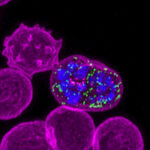Vaccines are preparations that stimulate protective immune responses against an infection or toxin, using a harmless component, or weakened form of the infectious agent or toxin. For example, most current vaccines stimulate the production of immune proteins called antibodies that specifically neutralise the particular infection or toxin against which the vaccine has been made.
Vaccines can take several forms. They may be:
- Killed microbes of the type that, when alive, cause illness.
- A weakened form of the microbe, or a related microbe, that causes less severe infection.
- A purified component of the microbe, such as a particular protein or carbohydrate, that triggers protective immunity.
Some vaccines also contain substances, called adjuvants, that boost the immune response.
Most vaccines are given as injections, introducing the vaccine into a muscle or a layer of the skin. Some vaccines, particularly for infections that enter the body through the digestive tract, are given orally. The route of delivery of a vaccine influences the characteristics of the protective immunity that is developed.








